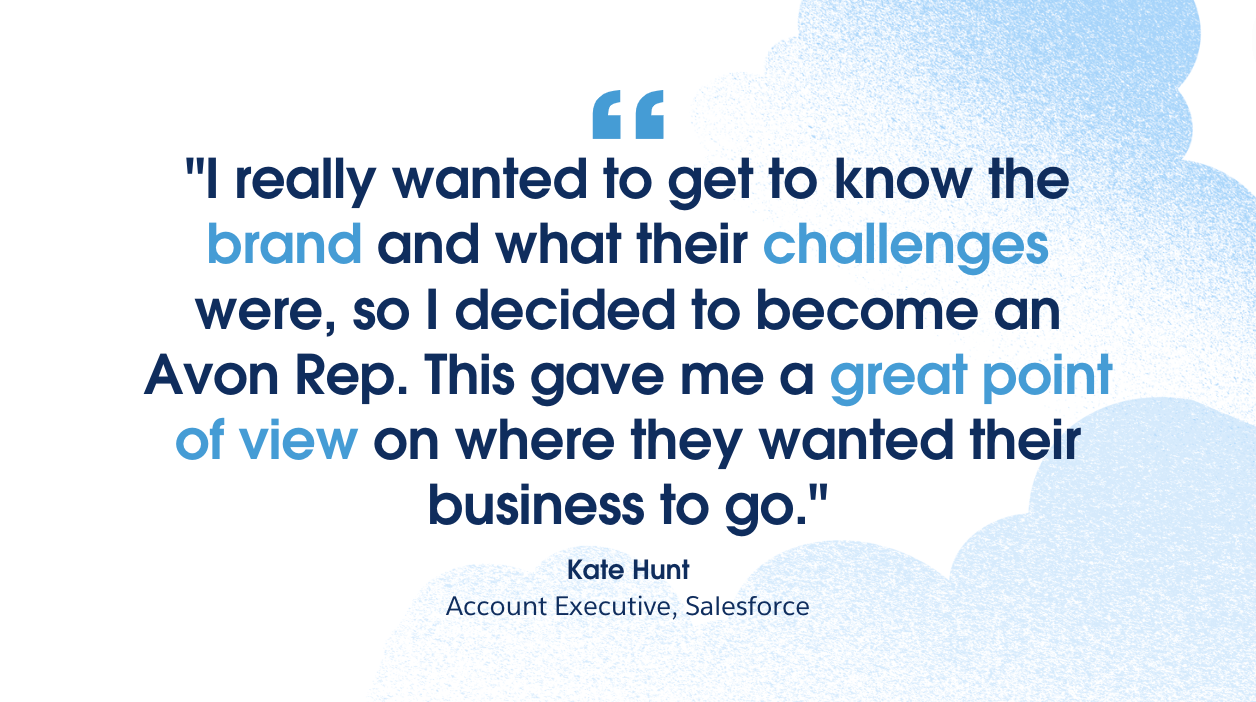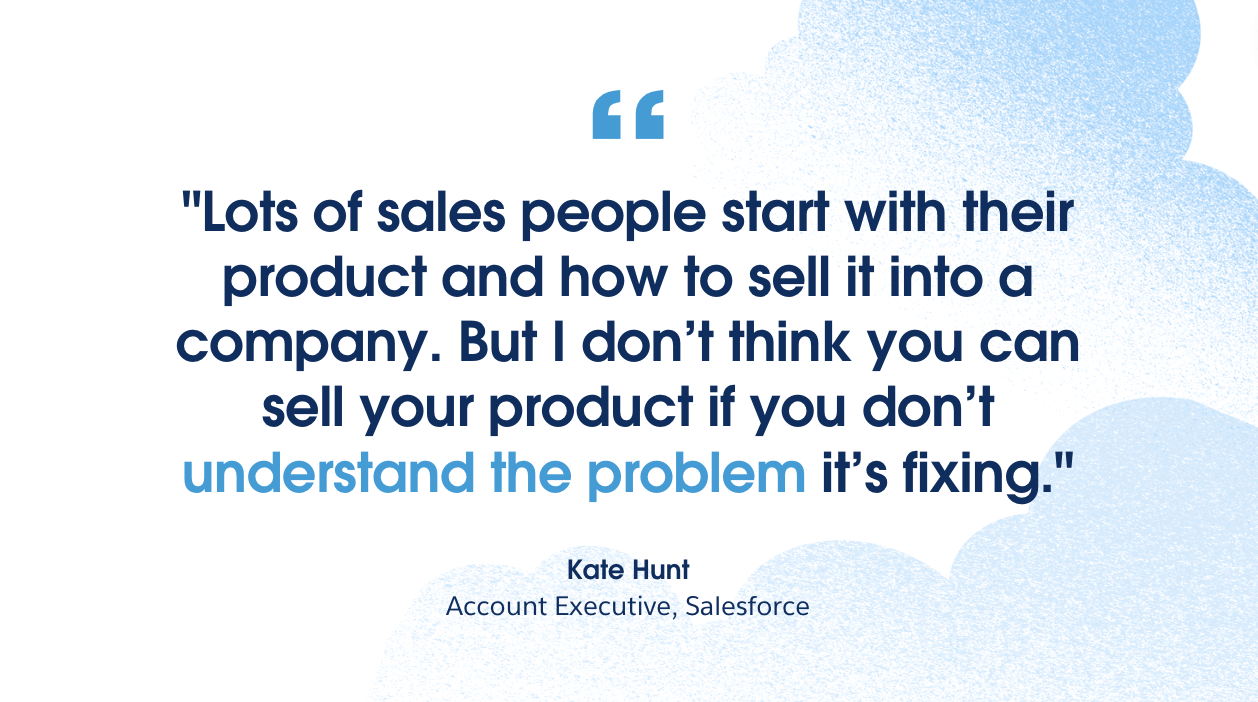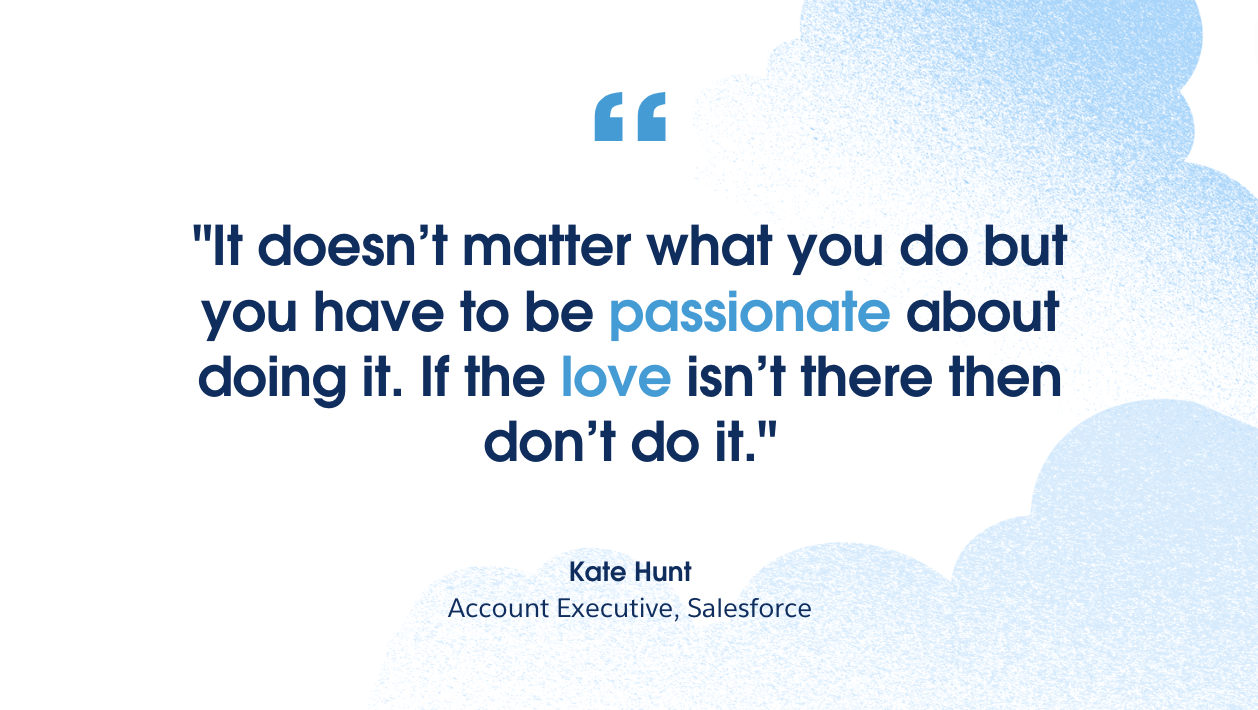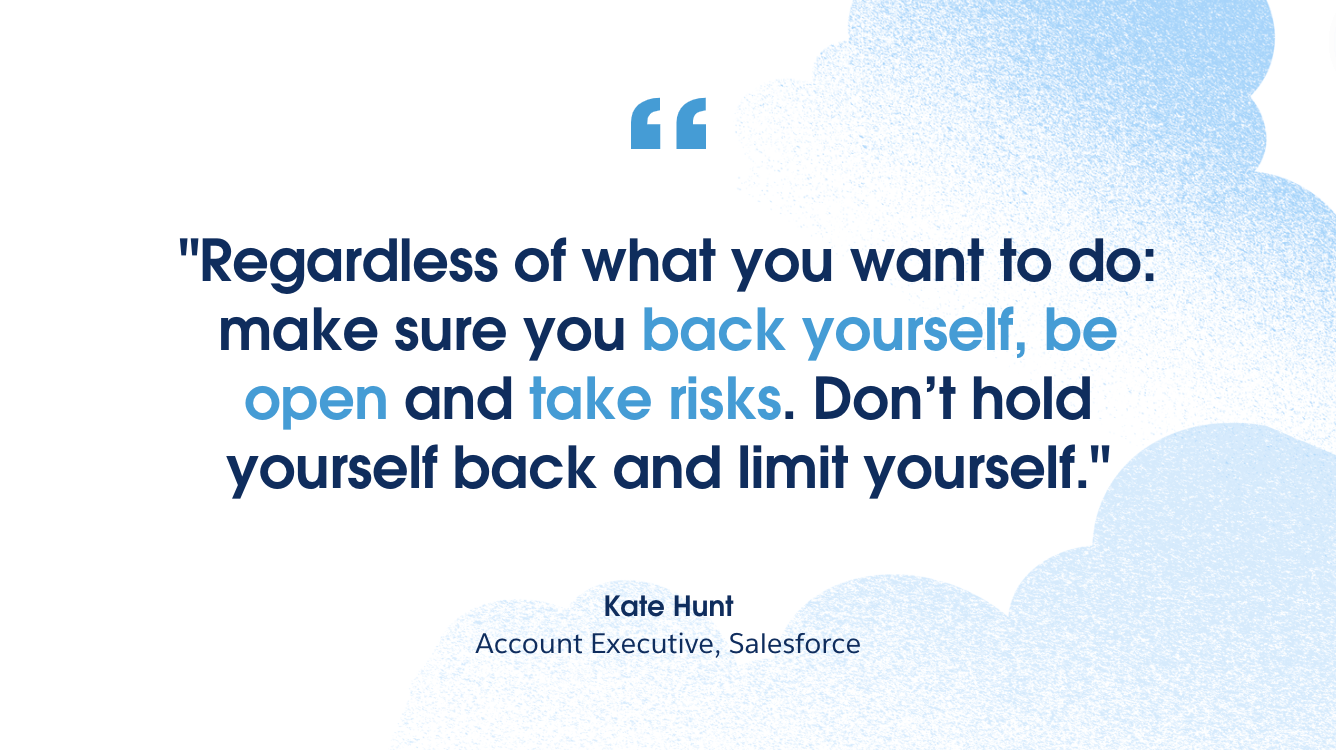The theme of this year’s International Women’s Day was #EmbraceEquity and presented an opportunity to imagine a gender equal world, one free from bias, stereotypes and discrimination, where difference is valued and celebrated. At Salesforce we’re committed to making the world a more equal place and we believe we’re more powerful together. That’s why this March we’ve shared stories from the incredible women we work with.
To finish up our #EmbraceEquity activity, we sat down with Kate Hunt, Account Executive, to talk about her fascinating career journey, how she transitioned back to work after having children and what it’s like to work in male dominated industries.

The past nine months have been a really exciting time for you: you’ve returned to work after having your second baby, pitched for and won a contract with Avon, and spoken at our UKI 2023 Corporate Kick Off. Can you talk us through how the past nine months have been for you?
That’s a great summary for what feels like a lot of activity! Yes it’s been a hectic but incredible few months. I came back to work at Salesforce after having my second child in June 2022. I ramped in working four days a week until September as I couldn’t get childcare and had to balance trying to kick off my career again with the mum life rhythm.
A lot changes in a year, so I came back to a new team, a new manager, new accounts and a new office. I joined Salesforce in 2020, so because of COVID-19 I never went into the office. It was very strange but I was really excited as one of my new accounts was Avon.
I really wanted to get to know the brand and what their challenges were, so I decided to become an Avon Rep. I signed up and started getting to grips with selling using their tools. I found myself talking about Avon products to my family, friends and to parents at the school gate! My Avon business grew organically and it gave me a great point of view on where they wanted their business to go.
I completely fell in love with the brand and still use their products today. This meant that when it came to pitching for their business it was really easy to talk about what challenges they face and how we could help, as I was such a huge fan. This passion led to us closing a deal with them to support their future growth at the start of 2023.
So yes, it’s been a busy few months but so exciting and rewarding.

Taking on an extra role in order to understand your customer better isn’t a traditional choice, especially as a working parent. Can you talk about your mindset when you’re approaching a project like this and how you balanced that with returning to work?
When I was looking at the Avon account I started by creating an Orbit. This is a simple tool that helps identify: what is my customer’s future vision? Where are they now? What’s the path to get there?
Becoming an Avon Rep wasn’t a conventional approach to learning an account but it was really helpful as I identified their challenges and opportunities at the ground level. Then I layered over how Salesforce could help to bridge the gap and created work streams for my team.
Lots of sales people start with their product and how to sell it into a company. But I don’t think you can sell your product if you don’t understand the problem it’s fixing. You have to think customer first and that can require a bit of extra effort. But it’s worth it to get those deep insights into your customer.
It wasn’t easy to balance this with returning to work. It was scary at times but I leaned on my manager, Felicity, and was really transparent about what I needed. She was really supportive, so I felt like I could be in learning mode, which took the pressure off.

Returning to work after any absence can be daunting but especially returning from parental leave, where you have a whole new set of responsibilities to contend with outside of work. What advice would you give to managers with team members who are on parental leave?
Make sure you’re checking in and keeping your team members up to date as much as possible, and as much as they want to hear from you. A lot can change in a year and I personally liked doing team meetings, so I could switch my adult brain on for a bit but not everyone wants to do that.
I’d also say phone calls are really nice. Emails are so easily missed when you’re not at work, so having conversations over the phone about any changes going on can be useful.

The tech sector is considered quite male dominated, although that is changing and is something Salesforce are working to change too. You’ve worked in other male dominated industries throughout your career. How have you approached those industries and what have you learnt in the process?
I didn’t have a plan of what I wanted to do when I left university. I grew up watching both of my parents be really entrepreneurial, so I decided to study Management and Business at Aston University. I knew it’d give me insight into a range of areas, so I could decide later what skill to master.
I applied for my first job selling software to car dealerships and didn’t consider how male dominated it might be. I just liked the salary and the fact I was going to get a company car! It didn’t take long to realise that I was treated differently because I was a women. I was seen much quicker than my male colleagues when I was making sales calls, so I ended up being really successful as I could be more productive with my time. But I learnt that I might have gotten into the room more quickly but I had to justify being there and sell harder. This sort of unconscious bias wasn’t something I’d been aware of before.
After that, I’m very lucky to say that I didn’t directly apply for other roles, I was contacted by someone I’d worked with before who asked me to interview for a particular job, so I got to experience a range of industries from builders merchants and automotive to tech, as well as a variety of roles in sales and marketing.
Regardless of the industry or role I always felt passionate about what I was doing. I believe in the Greek term “meraki”, which means doing something with a sense of pride and care, and that’s how I approach every role I’ve done. It doesn’t matter what you do but you have to be passionate about doing it. If the love isn’t there then don’t do it. I still get a bit giddy when I see products that I used to sell in stores or brands that I used to work for doing well. I feel like I’ve been part of that process and that makes me really proud.
This broad experience and passion has given me a very strong business acumen. Now I’m able to confidently sit down with CMOs, CIOs and even CEOs to have a strong conversation on where they want their business to go. I know I can add knowledge and add value, and that’s so rewarding.

Do you have any advice for women wanting to enter male dominated industries?
I’d probably start by saying, you need to be prepared to stand up for yourself. I had to do it myself many times and sometimes it’s a difficult road to go down. You have to feel brave enough to escalate things and talk about it. If something makes you feel uncomfortable, or pressured in anyway, then say so.
For anyone that’s in a minority situation, don’t allow yourself to be marginalised. Stand up, say something and walk away if necessary. Your pride and self worth are too valuable to remain silent.
On the other side I’d say, don’t be daunted by it. I had a great time working in those industries and it’s given me all the life experiences I’ve had, which I wouldn’t swap for anything. The world of business is quite different now. I think people are more aware of bias and are working harder to be more inclusive, which is a positive step forward.
In general I’d say to all women, regardless of what you want to do: make sure you back yourself, be open and take risks. Don’t hold yourself back and limit yourself when you don’t have to. I truly believe that if you love what you do and you try your hardest then you’ll get to wherever you want to go, so continue to be part of the conversation and be true to yourself.








